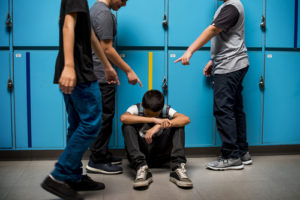
Chances are unfortunately high that any of us, at some point in our lives, will have an experience related to bullying, be it directly or indirectly. It may vary in intensity and circumstance, but all forms of bullying potentially pose a major issue. Why? Because bullying can happen anywhere, from schools to playgrounds, in both public and private places, and even at home. As long as there are imbalances in power in any social interactions, bullying can seem impossible to be solved. But don’t lost hope. Read on to find out more about bullying and how to cope.
What is Bullying?
Bullying is any form of aggressive behavior meant to harm or humiliate others. This unwanted behavior is very likely to be repeated and tolerated without outside intervention. If the bully succeeds, a power imbalance between two or more people is created, in which the bully takes control of the relationship dynamic. This can result in intentional distress or harm towards the person being bullied.

What are the Different Forms of Bullying?
Bullying can take on many forms. Physical bullying involves direct assaults and the use of harmful instruments meant to cause physical harm. Verbal bullying involves the use of offensive remarks, whether oral or written, to directly attack the victim. Emotional or relational bullying is a somewhat indirect way to abuse another person via psychological trauma. Cyberbullying emulates verbal bullying through the use of offensive remarks using communications technology as a medium.
A single offensive remark or a punch in the stomach does not automatically mean bullying. Bullying is a consistent and repetitive habit that bullies use to get what they want. They appear to be tough and brash, the kind of person who does not care for the feelings of others. But according to studies, the bullies who harm others often have problematic relationships with their own families and friends.
On the receiving end of bullying, we have the victims. After all, the bullies would not exist without bullying others. Most of the time, these victims are part of a rather silent group of people who are passive powerless in the first place. This characteristic makes them an easy target for bullies.
The Mental and Emotional Effects of Bullying
 Bullying can begin at an early age and cause lifelong mental and emotional health effects. In fact, bullying is one of the major social issues. It can affect anyone and everyone in various ways.
Bullying can begin at an early age and cause lifelong mental and emotional health effects. In fact, bullying is one of the major social issues. It can affect anyone and everyone in various ways.
To the bullied
Victims of bullying are likely to manifest various psychological effects. Experiences of being bullied may lead to depression and anxiety as these are contributing factors in increased feelings of loneliness and sadness. Typical symptoms may include loss of appetite, disturbed patterns of sleep, and lack of interest in activities they used to enjoy. Youth who experience bullying may continue to present these symptoms until adulthood. Other health complaints may also be observed in teenagers who are bullied. They may be sick often and miss school days due to illness.
A child’s academic performance may also be affected. Decreased school participation leads to lower grades, as seen in their standardized test scores and GPA. These are contributing factors in skipping or altogether dropping out of school. This learning environment can be home to many bullying incidents, and even worst-case scenarios such as school shooting cases may be related to this issue. In the 1990s, the majority of school shooters had experiences of being bullied.
To the bully
Bullies are often noted as antagonists in these situations, but this behavior is often rooted from different psychological issues as well. Bullying may be an act of aggression and rejection. They too may suffer from mental and emotional effects which they may carry as they grow older.
These defiant behaviors are closely related to early alcohol and drug use which may later result in substance abuse. Their aggressive behavior may, later on, be observed outside of schools, such as vandalizing property, traffic citations, and other criminal offenses. They may also engage in early sexual activity. When it comes to their partners and children, they may eventually show abusive behavior and often get into fights with other people as well.
To bystanders
Being a witness of bullying can affect a child psychologically and be a traumatic experience as well. They may suffer the mental and emotional effects of both the bullied and the bully. They are prone to increased levels of tobacco, alcohol and drug use. They may also suffer from depression and anxiety. The bullying environment may also cause the child to miss or skip school.

How to Cope with Bullying
Every child or teen handles bullying, and the recovery from it, very differently. Each one has its own defense mechanism and coping strategies to deal with a confronting situation. Some of these protective responses are definitely more beneficial and mature than others.
When a person has what it takes actually to call out and cope with bullying, that person exhibits a healthy way of dealing with the difficult circumstance. Here are the characteristics that should be embodied by any person involved in bullying:
A stronger self-esteem
Building one’s self-esteem is vital in preventing bullying. Members of the youth who see and appreciate their own dignity are very unlikely to be targets of bullying. In the same way, a teen who understands and appreciates other people’s worth are less likely to bully others.
Fostering the self-esteem of children also helps them avoid other interpersonal problems, including peer pressure and unhealthy relationships.
There are a lot of ways to help a young person strengthen his or her self-esteem. A healthy relationship at home is a good start. Children and teens love it when they can communicate with their parents and siblings comfortably at home. When they feel respected this way, they are more likely to vocalize their concerns and be more open about their lives.
An individual with solid self-esteem is confident. When they exhibit confidence, they will not be swayed easily by a harmful bullying situation.
Not passive nor aggressive, but assertive
Passive children tend to let another person bully, thinking that it prevents the aggravation of the situation, that it will eventually go away and the bully will grow tired, among others. However, this is not the usual case since bullying is a cycle. When the victim finally tries to fight back, it may be in an aggressive way, which only deepens the bully’s desires.
Assertiveness is a social skill that children learn as they grow older. It is not only useful when encountering bullies, but also in everyday life. Assertiveness is the ability to stand up for the person’s rights politely and effectively. The key to being assertive is presenting their opinions in a confident but respectful way. This means that we must allow our children to make choices so they can express themselves properly, such as when and how to say “no.”
Assertiveness also manifests in knowing when to seek help when needed. That is why at an early age, we can start teaching and allowing kids to practice assertiveness in simple situations such as asking for directions from a police officer so they can transition this skill into handling bullies. A child’s personality may hinder them in learning assertiveness. A shy kid, for example, may find it harder to demonstrate this skill. It may take more time and practice for them to become more comfortable in expressing themselves, so the role of adults is to provide children with an opportunity to hone these skills.

Foster friendships and social interactions
Strengthening oneself and knowing how to react appropriately to a difficult situation may not be enough. No one should deal with bullying on his or her own after all. In an alarming circumstance such as bullying, a person needs all the help he or she can get. Friendship is a solid foundation where a child can feel safe.
Establishing a friendly relationship atmosphere is good for everyone. The bullied victim can have at least one reliable person to call on to. The bully will be less likely to cause harm to others if they have other healthy friends who understand them. Sure, there may be jokes that can get a little offensive at times, but at the end of the day, everything can be resolved easily if they remain true friends.
There are a lot of ways to help a young individual make new friends and strengthen their already existing friendships. Regular sleepovers and attending parties together are a good start.
Are you or your child experiencing bullying? Contact Capital Choice Counselling today!
Bullying should not be taken lightly. The suffering of each person involved may take a lifetime to heal. Seeking for help is okay. If you notice these symptoms or effects in your children, do not hesitate to reach out before it’s too late.
Counselling services can help you and your children cope with the mental and emotional effects of bullying. In a world where aggression and negativity can be found in every corner, we can still create a loving and nurturing environment for your child to grow in. Talk to us today about how we can help!
